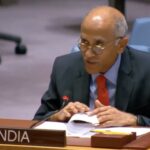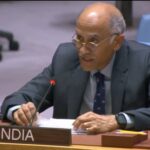Speaking at the United Nations Security Council Open Debate on Small Arms on November 10, 2025, India’s Permanent Representative to the United Nations, Ambassador Parvathaneni Harish, reaffirmed India’s strong commitment to “preventing, combating and eradicating the illicit trade in small arms and light weapons.” He emphasized that an integrated approach to Small Arms and Light Weapons (SALW) management must address both the “security and developmental dimensions.”
In his remarks, Ambassador Harish outlined five key elements he said were essential for effective SALW control: (i) national ownership through strong legislation and political commitment; (ii) a standardized organizational structure for coordinated action; (iii) effective data management to enable real-time tracing and accountability; (iv) risk management to prevent diversion and misuse; and (v) security protocols and deterrence measures to strengthen border control and stockpile management.
The Ambassador congratulated Sierra Leone for assuming the Presidency of the Security Council and convening the Open Debate, and described the illicit trade, trafficking, and diversion of small arms as a “major threat to international peace and security.” He noted that the issue has complex and multidimensional implications for development, security, humanitarian efforts, and socio-economic stability.
Ambassador Harish welcomed the Secretary-General’s report (S/2025/670) on ways the Security Council could strengthen its role in addressing small arms proliferation. The report, he said, underscores that the diversion and illicit trafficking of such weapons continue to sustain terrorist groups and armed organizations across conflict zones, facilitated by porous borders, weak stockpile security, and cross-border trafficking networks. The rise of improvised and craft-produced weapons, he added, further complicates tracing and accountability efforts.
“The illicit trafficking of small arms and related ammunition continues to be a major factor sustaining armed groups and terrorist organizations,” he said. “The consistent access of such entities to weapons highlights the need for coordinated action to prevent their acquisition. The Security Council must continue to uphold a zero-tolerance approach to terrorism in all its forms and manifestations and to those who facilitate, sponsor, finance or enable the use and movement of such weapons. Arms embargoes authorized by this Council are an important tool to restrict the flow of weapons into conflict zones and must be implemented consistently, objectively and without selectivity.”
Noting that India has long experienced the “scourge of terrorism,” Ambassador Harish said the country understands the dangers posed by the diversion and illicit transfer of small arms to non-State actors.
“India has suffered due to cross-border terrorism carried out using illicit weapons trafficked across our borders, including now through the use of drones,” he said. “The increase in the volume and sophistication of such arsenals reminds us that these groups cannot sustain themselves without being enabled, financed or supported.” He welcomed the consensus outcome of the Eighth Biennial Meeting of States on the UN Programme of Action on Small Arms and Light Weapons, which recognized the adverse impact of illicit arms trade on terrorism.
Calling international cooperation “indispensable,” Ambassador Harish urged greater efforts to prevent diversion, disrupt trafficking networks, and enhance customs and border coordination. He emphasized that strengthening the implementation of the UN Programme of Action (PoA) and the International Tracing Instrument (ITI) requires strong national legislation, enforcement, export controls, information sharing, and capacity building.
He also noted India’s active participation in developing the Global Framework for Through-life Conventional Ammunition Management, expressing hope that it will bolster safe, secure, and sustainable ammunition management practices and help combat illicit diversion to terrorist entities.
The Ambassador further suggested that UN Peacekeeping Missions, where appropriately mandated, could assist host States in building institutional capacity for stockpile security, marking, registration, and disposal of recovered weapons. However, he cautioned that peacekeeping missions “should not be assigned embargo-enforcement roles,” warning that such responsibilities could alter their mandate and expose peacekeepers to operational risks.
Ambassador Harish highlighted India’s regular submission of national reports under the PoA and ITI frameworks, noting that the country has “strong legislative, regulatory and administrative mechanisms” to combat arms trafficking. “India also maintains strict export controls over all munitions and related items,” he said, adding that India’s participation in the Wassenaar Arrangement, including during its Plenary Chairship in 2023, reflects its “constructive efforts to strengthen global non-proliferation norms, including in the area of Small Arms & Light Weapons.”
On gender-responsive capacity building, he shared that Indian women Armament and Ammunition Technical Officers have participated in UN-led regional seminars and served as trainers in conventional ammunition management programs, contributing to the implementation of the Global Framework and promoting the inclusion of women experts in the field.
“India remains committed to sharing its expertise and advancing inclusive approaches to safe and accountable ammunition practices,” Ambassador Harish said, reiterating “India’s firm commitment in preventing the misuse of small arms and light weapons by terrorist groups and thereby continue to contribute in the global fight against terrorism.”






